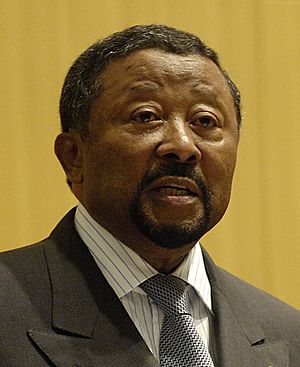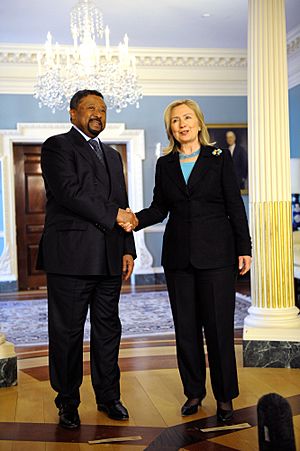Jean Ping facts for kids
Quick facts for kids
Jean Ping
|
|
|---|---|

Ping in 2008
|
|
| Chair of the African Union Commission | |
| In office 28 April 2008 – 15 October 2012 |
|
| Preceded by | Alpha Oumar Konaré |
| Succeeded by | Nkosazana Dlamini-Zuma |
| President of the United Nations General Assembly | |
| In office 17 September 2004 – 18 September 2005 |
|
| Preceded by | Julian Hunte |
| Succeeded by | Jan Eliasson |
| Personal details | |
| Born | 24 November 1942 Omboué, French Equatorial Africa (now Gabon) |
| Political party | Union of Forces for Change |
| Residence | Libreville |
| Alma mater | University of Paris 1 Pantheon-Sorbonne |
Jean Ping (born 24 November 1942) is a diplomat and politician from Gabon, a country in Central Africa. He was the leader of the African Union Commission from 2008 to 2012.
Jean Ping is special because his father was Chinese and his mother was Gabonese. This made him the first person of Chinese background to lead the main part of the African Union. He also served as Gabon's Minister of Foreign Affairs from 1999 to 2008. From 2004 to 2005, he was the President of the United Nations General Assembly. In 2016, he ran for president of Gabon against Ali Bongo Ondimba.
Contents
About Jean Ping
Early Life and Family
Jean Ping was born in Omboué, a small town in Gabon. His father, Cheng Zhiping, came from China in the 1920s to work in timber. His mother, Germaine Anina, was Gabonese. His parents encouraged him to study in France.
He earned a doctorate degree in economic science from the Pantheon-Sorbonne University in Paris in 1975. Jean Ping is a father of eight children.
Important International Roles
In 1972, Jean Ping started working for UNESCO in Paris. UNESCO is a part of the United Nations that focuses on education, science, and culture. From 1978 to 1984, he was Gabon's main representative to UNESCO.
He was also the president of OPEC in 1993. OPEC is an organization of countries that produce oil. In 2004, Jean Ping was chosen to be the 59th President of the United Nations General Assembly. This is a very important role where he helped lead discussions among countries at the UN.
In 2008, he was elected to lead the African Union Commission. The African Union is a group of African countries that work together for peace and development. He held this position until 2012.
Political Career in Gabon

After working internationally, Jean Ping returned to Gabon in 1984. He became the chief of staff for Gabon's President, Omar Bongo. This was the start of his political career in his home country.
Serving as a Minister
Jean Ping held many important government jobs in Gabon. In 1990, he was the Minister of Information and Telecommunications. Later, he became the Minister of Mines, Energy, and Water Resources.
From 1994, he served as the Minister of Foreign Affairs and Cooperation. He held this role for several years, which meant he was in charge of Gabon's relationships with other countries. He was also elected to Gabon's National Assembly multiple times.
He continued as Minister of Foreign Affairs until 2008, when he was elected to lead the African Union Commission. In 2014, Jean Ping left the ruling Gabonese Democratic Party (PDG). He then worked to bring together different opposition groups.
The 2016 Presidential Election
In 2015, Jean Ping announced he would run for president in the 2016 Gabonese election. He became one of the main candidates, along with the current president, Ali Bongo. Several other candidates supported him and stepped aside.
After the election on August 27, 2016, the official results were announced. Ali Bongo was declared the winner with 49.8% of the votes. Jean Ping received 48.2%, losing by a very small number of votes. The opposition claimed there were problems with the results, especially in one province where voter turnout was unusually high.
After the results, Jean Ping's campaign headquarters were attacked. He said that he believed he was the true winner of the election. Many international groups, like the United States and the European Union, asked for the election results to be checked again.
On September 24, 2016, Gabon's Constitutional Court confirmed Ali Bongo as the winner. Jean Ping disagreed with this decision. He said that the people of Gabon would not accept it.
After the Election
After the election, Jean Ping continued to work for political change in Gabon. He wanted to solve the country's political problems peacefully.
An election observation group from the European Union released a report. It said there were problems with how the election results were counted. Jean Ping said this report showed that he had won the election.
In December 2016, Jean Ping asked the International Criminal Court (ICC) to look into events that happened around the election. He claimed that people were harmed during the post-election period. He also organized a national meeting to discuss Gabon's future.
In 2017, the European Parliament passed a resolution about human rights in Gabon after the election. Jean Ping welcomed this. He continued to travel around Gabon and meet with people. He also met with members of the ICC about their investigation. Many Gabonese people living abroad also supported his efforts for change.
Awards and Honors
In Gabon
- Commandeur de l'Étoile équatoriale
- Grand officier de l'Étoile équatoriale
- Commandeur du Mérite maritime
- Commandeur de l'Ordre national du Mérite
In France
- Grand officier de la Légion d'honneur (2006)
- Member of the Association nationale des docteurs en sciences économiques (Andese-France)
Books Written by Jean Ping
- Mondialisation, paix, démocratie et développement : l'expérience du Gabon (2002)
- Et l'Afrique brillera de mille feux (2009)
- Éclipse sur l'Afrique : fallait-il tuer Kadhafi ? (2014)
See also
 In Spanish: Jean Ping para niños
In Spanish: Jean Ping para niños

